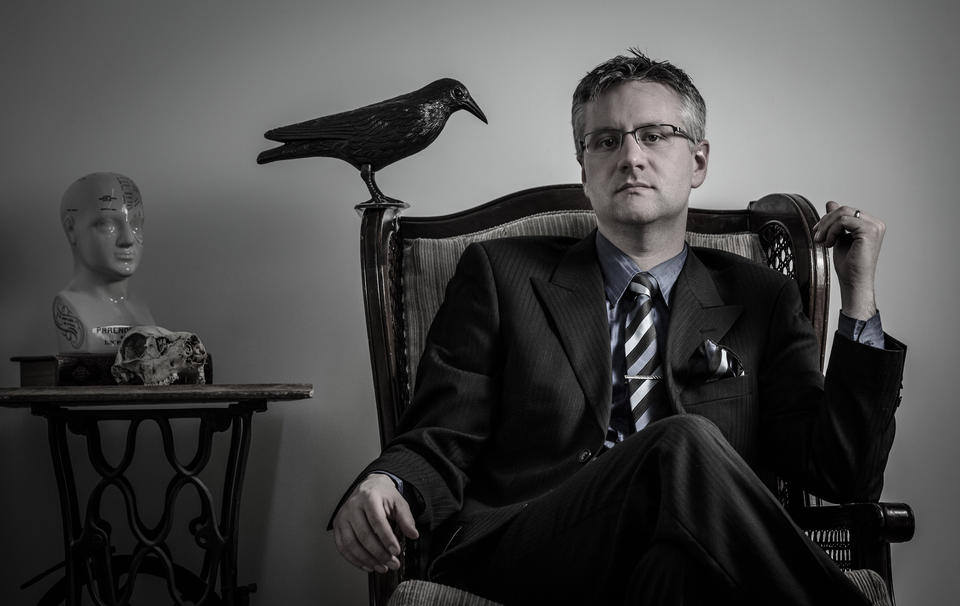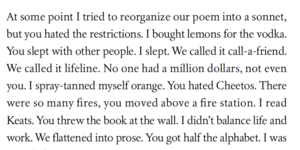
Sunday Poetry with Jonathan Ball
For today’s Sunday Poetry we asked Jonathan Ball, author of Clockfire andThe Politics of Knives, to write about his newest Coach House book, The National Gallery and how he likes to call himself “The Poet Laureate of Hell.”
*
Around the middle of The National Gallery sits this poem called “Wing Machine”:
Make me the poet laurate of Hell.
Writing will still hurt, but I’ll know why.
After these little deaths, when big I die,
Grant me Virgil and a frozen lake.
Make me the poet laurate of Hell.
Lay out my punishments in raven speech.
As devils pass me each to each to each,
I’ll ask my questions and receive my name.
Pretend I told you the truth in my poems.
Pretend that I said anything at all.
Pretend that I rose high enough to fall.
Make me the poet laureate of Hell.
Shortly after drafting this poem, I wrote this all-purpose author biography for myself (everyone refuses to print it, even though it’s the best one I ever wrote):
Jonathan Ball, PhD.
Author of stranger fiction.
Advocate of writing the wrong way.
Poet laurate of Hell.
As a whole, the project of my book The National Gallery is this: to ask the question “Why create art?” and then fail to answer that question, despite page after page of attempts to pose some poem as the answer.
Certain poems (and the title of the book) point to how we frame and re-frame our lives in art and art in our lives. A number of them (specifically, the long poem “iPhone Elegies”) meditate on how social media plays into this exchange.
Part of my job, in writing this book, was to wonder why I was writing it. Why this book, why write at all, and why write poetry? What is the role of the poet? What do I want from my poems?
This poem envisions what Hell might look like for a poet.
Heaven, for a poet, would be to stop writing. To somehow move beyond the need to express yourself in words, to refuse the lyric impulse and just be. And be understood. To find the right words, finally, then not need words at all.
Hell, for a poet, would be to write and be misunderstood. Which, of course, is the only way to write a worthwhile poem, because any poem that is worthwhile exceeds the possibility of being fully understood. Any great poem speaks beyond what its author meant to say, in tones no reader can fully hear.
Once, a book reviewer wondered whether or not I was being serious by trying to brand myself as the poet laureate of Hell. It seems ridiculous, but also seems to be precisely what I am doing. Of course, it’s both.
Both things go hand-in-hand, like horror and comedy. (If you want to do a comedic remake of Alfred Hitchcock’s The Birds, then all you have to do is add more birds.) This poem has a sad, serious, and sombre tone, but it’s named after a fast food chain whose mascot is a chicken flexing its biceps.
Failure has, after postmodernism, been vaulted to the status of an artistic value and high ambition. The poet laureate of Hell is the author of his failure. He wears a crown of knives.
*
Jonathan Ball, PhD, is the author of seven books, winner of three Manitoba Book Awards, and a writer and editor working in the publishing, film, and videogame industries. He teaches creative writing and hosts the podcast Writing the Wrong Way, which shows writers new ways to work and how to create innovative art. His book Ex Machina is available for free at www.JonathanBall.com/FreeBook and his most recent book is The National Gallery (Coach House Books).

